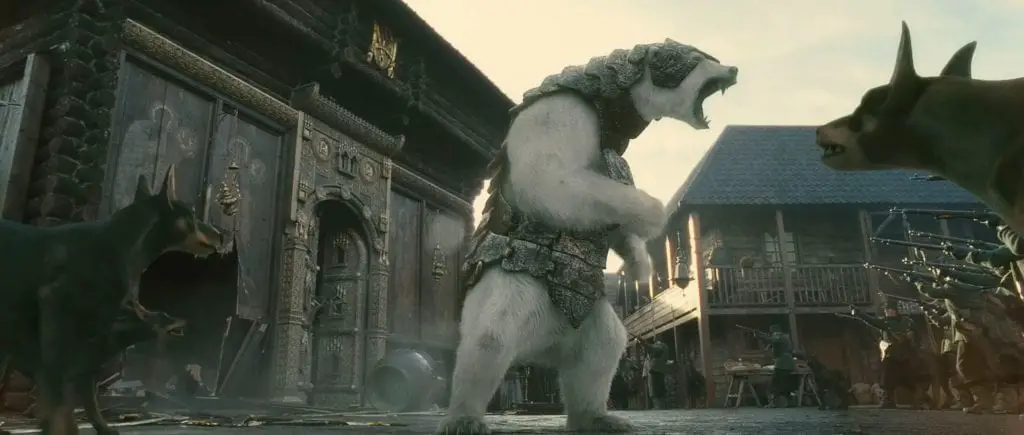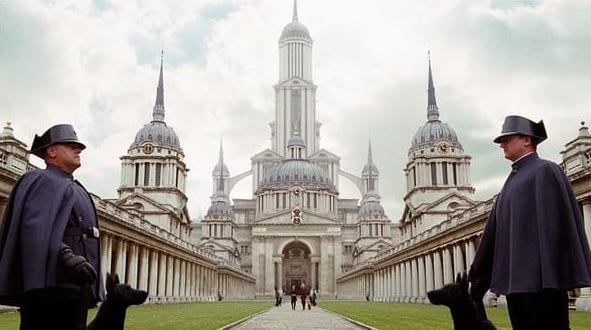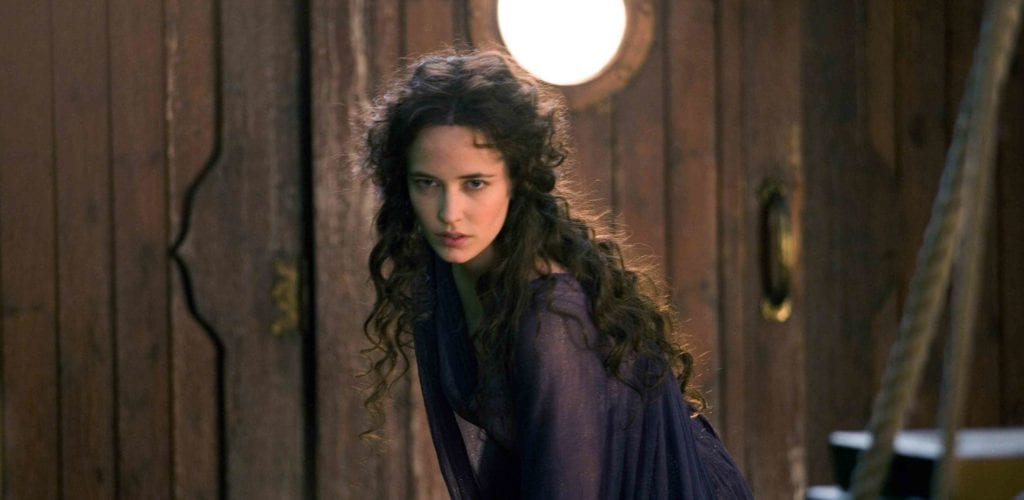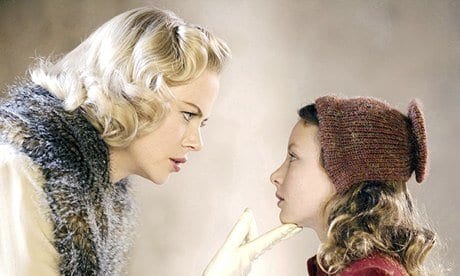In 2001 there was a little movie released, you may have heard of it…it was called Harry Potter and the Philosopher’s Stone. It made a shit-ton of money, and spawned a still expanding franchise. As always, when the film industry makes a successful movie, everyone else tries to decipher the formula so that they can have a juggernaut too. In this case, the thought process was: “Harry Potter is based off of a children’s novel. If I make an adaptation of a children’s novel, I will also become more rich.”
Unfortunately for the financiers of Hollywood, none of these attempts to ride the Children’s Literature Film bandwagon was especially successful. The Narnia movies probably did the best, but even those didn’t make much of an impact. Most were total disasters, like the Series of Unfortunate Events movie, or the horrible slew of live-action Dr. Seuss movies. (Let’s never talk about those…) Unfortunately for me, one of these attempts was based on a book series very near and dear to me, His Dark Materials.
Yes, I speak of 2007’s The Golden Compass, the film that pleased no one, but managed to piss quite a few people off. It didn’t piss me off, though, I must confess. (And I’m no stranger to rage at the horrible-ness of adaptations.) It probably did worse than that… It made me feel nothing. I guess there was some confusion.
As an adaptation, The Golden Compass hit all the checkboxes of plot, but, somewhere along the way, it was separated from its soul and spent two hours wandering the multiverse trying to find it.
I’ve never been one to research all the drama behind the scenes of productions. Even if that drama made them what they are, I’ve always been a proponent of the idea that you can only judge what’s on the screen in front of you. But even a cursory glance at the film’s Wikipedia page makes it quite clear that it went through a good deal of both Development Hell and Executive Meddling. And the seams really show.
Case in point, The Magisterium. Also known as “The Church,” though you would never know that from watching this movie. This very, very thinly veiled take on the Roman Catholic Church (the veil is made out of saran wrap) has always been the one thing that has made the book series controversial. No doubt the powers that be were aware of this and, well, they seemed to have chickened out—and midway through the production, too. They studiously purged all explicit mentions of religion, or god, and made damn sure none of the imagery looked remotely Catholic, or even Christian, except when it did. For example, the “district office of the Magisterium” in Trollesund is clearly and unambiguously a church.

There were no reference to sin, but they apparently couldn’t avoid the term “heresy”. I counted one reference to The Authority, but if you don’t know HDM, it could easily just have been “the authority” of the Magisterium that was being disobeyed.
So the Magisterium just seem like a bunch of old dudes who like to harm children because, like… vague science reasons? Dust means that people will think to disobey, which okay. But there’s not any clear sense that their legitimacy is based on anything other than control freak-ness and the fact that Derek Jacobi and Christopher Lee are there looking EVHUL. More evil in many ways than the Church of the books, because we have scenes of these old dudes sitting in dark rooms and plotting and stuff.
Yeah, Christopher Lee is in this film for a hot minute, sitting in a chair and looking evil. There’s some serious thespian cred here. They got Kathy Bates to be the voice of a jackrabbit for two lines.
The end result is that the religious themes are too whitewashed to please the fanbase of the book series, who tend to be the secularist type, but is vaguely anti-religious enough to upset those of the religious, especially the Catholic, persuasion.

Book snobs were also less than impressed with some of the major structural changes that were made to the plot. And I’m not talking about the fact that Mrs. Coulter is blonde. No one gave a fuck about that. I’m talking about the truncated ending, and the willy-nilly flop of the order of events in the final act.
Famously, the movie ends just before the climax of the novel, where Lyra finds her father in the north only to have him betray her by murdering her friend Roger to open a way between the universes. It’s kind of heavy. And it also contains the culmination of Lyra’s character arc in this novel. I imagine it was thought best to avoid such a downer ending, so the film cuts off just as Lyra is flying off in the airship with a speech full of smiles and hope.
Is it just me, or does that seem a little cruel?
There was also a major change made to the order of two major plot events; the attack on Bolvangar by the coalition Lyra put together, and the events in Svalbard where she helps Iorek Byrnison reclaim the throne of the Ice Bears. The only motive I can think of is that they wanted the climactic battle to be closer to the end. (Oh course, they wouldn’t have this problem if they kept the original climax from the source material, but whatever….) While it always annoys me when adaptations make these kinds of massive structural changes, it didn’t need to necessarily break the movie like it did. There’s no reason the events couldn’t have happened in the opposite order; one didn’t cause the other or anything, but the story as it is in Northern Lights followed in an organic and clear manner, while the one in The Golden Compass did not.
This is ultimately an effect of the devotion to the checkboxes. Combined with a devotion to a sub 2-hour run-time, I suppose. Every plot point and twist has to be hit, but there’s no time to allow them to develop or breathe, so you end up with little more than a sequence of stuff happening. Mrs. Coulter takes Lyra to London and they get their hair did, but then, suddenly, and with no progression, Mrs. Coulter becomes terrifying and Lyra decides to run away. Then the Gyptians rescue her and they’re off to the North because that’s where the missing kids are. Oh look, it’s Serafina Pekkala, and she comes bearing exposition.

The interlude in the Ice Bear Kingdom might be the best example of this. Iorek, it must be said, may be the best developed minor character, and it’s easy to root for him in his fight with Ragnar Sturlusson, (they changed the name from the book, but it’s not especially important). But the context, the significance of this for the bears, is not really discernible. There is a passing mention to how Ragnar wants a daemon, and that he’s a usurper, and he looks sufficiently ridiculous sitting on a throne, but a viewer unfamiliar with the source material would have little reason to appreciate how important it is that he had a throne inside of a palace to sit on in the first place, or understand how Iorek being restored would change this.
Then, as soon as the single combat is over (did you know you can slap a bear’s jaw off his face and there will be no blood at all?) the plot just drops any follow-up so that Lyra can ride off on Iorek’s back to Bolvangar.
It’s just one thing after another, with very little indication ever about why something is important or how the audience may have earned the information that’s just baldly stated. (Did you know the witches have a prophecy about Lyra?)
The Exposition Train is speeding out of the station at the same clip as an unarmored bear running across the tundra for the whole movie. It begins in the opening narration, where the film rather awkwardly gives away key pieces of world building, like the nature of daemons and the existence of parallel universes. The film, it seems, has little confidence in the world building of the source material, or in its own ability to exposit without resorting to people explaining things to each other that they should already know.
I mentioned a few paragraphs up that I quite liked the character of Iorek Byrnison and how he was introduced, but he was really the only character I was entirely satisfied with. Nicole Kidman’s performance as Mrs. Coulter didn’t exactly do it for me. I can appreciate how difficult a character this would be to portray. She has the otherworldly ability to charm and enchant everyone. Kidman’s performance is trying a little too hard to make this happen. At first I thought it was a bit too sexual, but I’m not sure about that anymore. I think it’s a general lack of subtlety. It’s not entirely her fault either, since the script needs her to be suddenly evil and violent atmore than one point. She slaps her own daemon around. Which… okay. She ends up more creepy than charming. And her voice is weird and breathy.

Lyra’s inconsistency of character is all the writing. She’s alternately kind of a jerk and super empathetic, with nothing happening to justify the transition. Lyra is just a kid, and kids are naturally selfish and impulsive, so when she’s spitting plum stones at people for lolz I guess I can deal, but then she is so full of empathy for Iorek and you’re not sure where the progression is. There is some effort to develop her bullshitting superpower that will one day save free will, but, especially since her time with Mrs. Coulter is reduced to a hair salon montage, we get little sense of the way her arc unfolds: by expanding her experience of the world and providing her with ways of judging people past their superficial qualities and her snobby, rather sexist, lens.
The other performances are nothing to write home about. Sam Elliott was perfectly cast as Lee Scoresby, but was given little to do. Eva Green as Serafina Pekkala didn’t really have a chance because the script just had her randomly appearing at odd moments. I think she was trying to be intense and nice at the same time?
In general, I’m quite glad this movie never spawned a sequel. I cringe at even the thought of The Amber Spyglass getting this treatment. It’s an odd mixture of narrative cowardice and plot overreach that tried to do everything, without seeming to understand what it wanted to say.

